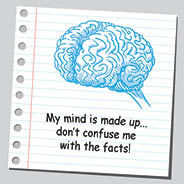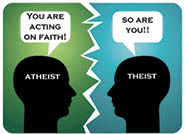
Editor's Note: Each year $1000 scholarships are given to young people who write and submit an essay on the theme “Science and Faith Are Friends, Not Enemies.” These are memorial scholarships in memory of Connie Parsons (John Clayton's aunt), Phyllis Clayton, and Edith Lawson (Phyllis' mother). The following essay is by our 2012 winner, Jeremy Jinkerson of Memphis, Tennessee.

THE (SO-CALLED) HISTORY OF THE CONFLICT
Since before I first began reading Does God Exist? in 2001, John Clayton has used the tag-line “It's scientists vs. preachers, not science vs. the Bible.” In many ways, he is right. The science versus faith dialogue typically starts with the assumption that science has upheld common-ancestry evolution over creation in explaining the history of the universe. “Faith” is offered as a non-fact-based belief system that involves accepting the presumably-false account that God created the universe. “Science,” on the other hand, is put forth as a system of facts that has proven neo-Darwinian evolution. It is often culturally accepted not only that science and faith are incompatible, but that in the search for truth, science has defeated faith. Fortunately, this statement is only a presumption, and it is one that we can understand.
The viewpoint that science and faith are enemies is generally endorsed by scholars as propaganda developed in the nineteenth century (Berger, 1999). It was first articulated in John William Draper’s History of the Conflict Between Religion and Science (1874/2012). Draper was a chemist who favored applying physical science to history, and as he interacted with Darwin's On the Origin of Species, Draper came to believe that religion (which was to him strictly Roman Catholicism) was incompatible with science. His book is riddled with outright falsehoods, and it is generally understood as an example of prejudice against religion (D’Souza, 2007). Andrew Dickson White made the conflict viewpoint commonplace in his History of the Warfare of Science with Theology in Christendom (1896/2011). Although both of these documents have been identified as misleading and baseless, their effect has been tremendous. They are sources which can quickly be cited to support an atheist viewpoint with hope that the reader will not evaluate the historicity of the cited text. Given that such citations are generally made by atheists to other atheists, there is little reason to check sources. In reality, clashes between science and religion have been minimal and notably overblown; even the Galileo trial is typically embellished. The fact is that science actually developed out of faith and a desire to understand God’s natural world more completely (D’Souza, 2007).
THE PHILOSOPHY OF SCIENCE
The careful reader may notice that I am not using science to refute the position that science and faith are enemies. That is because it is not a scientific proposition. It is a philosophical position — one borne of man's thought. But philosophy and science are sometimes mistaken for each other. For instance, Richard Dawkins (2006) opened his best-seller The God Delusion with the statement that philosophy no longer produces knowledge, and that all future truth will come from science. In doing so, Dawkins fails to realize that he is making a self-refuting statement — because that statement is a philosophy about how he views science. Science itself does not make statements of philosophical import such as “There is a God” or “There is no God.” Rather, science is concerned with better explaining the natural world through the accumulation and organization of facts. Specifically, as a means of increasing knowledge, science is considered to be empiricism plus logic. That means that science takes observable facts from the natural world, and then thinks about how they fit together. Science, by its nature, is precluded from making metaphysical statements. It has no comment on issues like the existence of God. As Mr. Clayton notes, science is not the enemy, but it is sometimes mishandled by scientists — or as you will see, a particular kind of scientific philosopher.
PREACHERS AND SCIENTISTS
 As to the debate between scientists and preachers, first let me note the problem with preachers being antagonists. Historically, when preachers have attempted to enter into the debate between so-called scientists and Christian apologists, they have fared poorly. This is because they are attempting to enter into an academic world in which they are untrained, and they often make the mistake of using the Bible as an authoritative source in an arena where it is not considered absolute. Even worse, preachers sometimes use scientific speculation or conjecture to support conclusions that they have presumed prior to entering the discussion. I must confess that I was guilty of the same misguidance when I applied for this scholarship some years ago (Jinkerson, 2005).
As to the debate between scientists and preachers, first let me note the problem with preachers being antagonists. Historically, when preachers have attempted to enter into the debate between so-called scientists and Christian apologists, they have fared poorly. This is because they are attempting to enter into an academic world in which they are untrained, and they often make the mistake of using the Bible as an authoritative source in an arena where it is not considered absolute. Even worse, preachers sometimes use scientific speculation or conjecture to support conclusions that they have presumed prior to entering the discussion. I must confess that I was guilty of the same misguidance when I applied for this scholarship some years ago (Jinkerson, 2005).
But let us not make the presumption that preachers are the only ones who have preconceived notions. When it is “scientists” attacking faith, they are often not behaving as true scientists. Scientists, at least theoretically, follow the scientific method. This means that they form research questions, develop hypotheses, objectively test the hypotheses, and then form new research questions and hypotheses accordingly. Put another way, scientists adjust their belief systems based on what they find to be true. In our current dialogue between “scientists” and preachers, we instead find ill-trained philosophers masquerading as “scientists.” As I earlier noted, the historical battle between science and faith is fictional, but it is fiction that has been well-accepted.
THE SCIENCE OF BELIEF
To understand why such falsehood is accepted on so grand a scale, it is necessary to offer some consideration to the science of belief. The psychology of belief is a field unto itself, and I will not attempt to do it justice here. Instead, I would like to make some general statements that will help frame our understanding about the belief of science being in conflict with faith. Despite what many scientists would have you think, or perhaps even what you find most palatable, our most fundamental beliefs do not come from logic, empiricism, or authority. Rather, our most simple beliefs are formed prior to engaging in science or speaking with our parents. Such premises are called “properly basic beliefs” (Plantinga, 1985). These beliefs would include items like “I am a self,” “There is an external world,” and “Other people have minds.” For many of us, belief in God is a properly basic belief. Developmental research has shown us that we often engage in specific experiences to have our own beliefs reinforced (Pomerantz & Thompson, 2008). That is, our beliefs are fundamental and shaped by our earliest experiences; they are also difficult to change. In one such supportive study, Westen (2007) found that people are willing to persist in their pre-conceived beliefs about their political candidates being good men, even when such men are empirically shown to be liars and buffoons. The phenomenon can even be studied neurologically. When one encounters a strong belief that is in opposition to his own previously held belief, one experiences fear/panic, which can be tracked in the amygdala of the brain. As the fear is logically combated, it is resolved with activity in the left frontal lobe (but not the portion involved in reason). What is incredible about this process is that there is an “inoculation”effect in which people are less threatened by contradictory information the more often they have made up their minds with regard to a certain idea. They form psychological defenses against new beliefs. In practice, this means that it is incredibly difficult to convince an atheist that God exists because the atheist has rejected statements about God so many times. Paul describes such a process in Romans 1:28 (NIV), stating, “God gave them over to a depraved mind.”
 Some scientists have gravitated towards atheism, and it has not helped the theists’ case that many preachers make statements that are patently untrue. So these scientists believe that common ancestry evolution explains all of natural history, and with equal import, they believe the common axiom that intelligent people believe in neo-Darwinian evolution. When preachers make statements about the origins of the universe that are not in keeping with modern scientific fact (i.e., age of the earth), this further reinforces the scientist’s idea that people of faith are ignorant. So these scientists are trained to believe that common ancestry evolution has incredible explanatory scope, and that people of faith are ignorant. The very viewpoint then compounds upon itself, as atheists tell each other that religious people are ignorant. Such is reminiscent of what Paul's description of people who “gather around them a great number of teachers to say what their itching ears want to hear” (2 Timothy 4:3, NIV).
Some scientists have gravitated towards atheism, and it has not helped the theists’ case that many preachers make statements that are patently untrue. So these scientists believe that common ancestry evolution explains all of natural history, and with equal import, they believe the common axiom that intelligent people believe in neo-Darwinian evolution. When preachers make statements about the origins of the universe that are not in keeping with modern scientific fact (i.e., age of the earth), this further reinforces the scientist’s idea that people of faith are ignorant. So these scientists are trained to believe that common ancestry evolution has incredible explanatory scope, and that people of faith are ignorant. The very viewpoint then compounds upon itself, as atheists tell each other that religious people are ignorant. Such is reminiscent of what Paul's description of people who “gather around them a great number of teachers to say what their itching ears want to hear” (2 Timothy 4:3, NIV).
NATURALISM
Underlying the belief that religious people are ignorant is a belief much more insidious: the presumption of naturalism. Naturalism is the philosophy that nothing can exist or be understood besides the natural world. Most of the atheistic scientists are naturalists at heart. Let us consider the difference. A scientist gathers facts and attempts to understand the natural world. He or she follows information to its logical conclusions. A naturalist who is employed as a scientist will do much of the same thing — except he or she will never lend any credence to a supernatural hypothesis. This is because the existence of a supernatural world has been ruled out prior to engagement in science. This is the root reason that many scientists refuse to have discourse with Christian evidence and argument. They may claim that they have followed evidence to atheism, but in many instances, these naturalists became atheists through personal history, like exposure to false religion or family deaths. Typically, the most fundamental viewpoint that they bring to the scientific situation is not one of objectivity but of philosophical bias.
This is the reason that they will not rationally react with the very compelling arguments for God’s existence which are backed by empirical evidence. When naturalism is presumed before the fact, the naturalist is forced to accept another doctrine besides God to explain the history of the world. Historically, this belief has been that the universe is eternal (Sagan, 1985). However, after information has increased about the origin of the universe and its apparent fine-tuning, naturalists have been forced to give up this point and have instead grasped at speculative hypotheses.
Let us give consideration to what these so-called “theoretical” scientific models really are. Although Webster provides a disturbingly limited and inaccurate definition of “faith,” Paul provides the following one: “Now faith is the substance of things hoped for, the evidence of things not seen” (Hebrews 11:1, NIV). Under this definition, naturalism can be seen as a sort of faith, in that it is a belief pattern that is “hoped” to be true and cannot be seen. Naturalism is not something that can be empirically verified. In fact, it is a totally unfalsifiable proposition, but it is still endorsed by many people. In this light, naturalism can be understood as a faith. So it is not science versus faith, but faith versus faith. (Although I grant that naturalism is not based on evidence whereas Christian faith is, I find it helpful to frame the conflict as “faith vs. faith” to bring out fundamental assumptions and thereby level the playing field.)
Many hold that the existence of God cannot be proven absolutely, but I have just noted that naturalism itself is beyond proof. How then, can one approach belief? In some scientific fields, it is often assumed that nothing can be proven definitively. Instead, when enough scientific and logical/theoretical fact mounts, one begins to believe a truth. So I pose the following question: How much data and understanding is necessary to reject atheism and believe in God?
ARGUMENTS FOR THE EXISTENCE OF GOD
As I have noted earlier, the existence of God is less a scientific question and more a philosophical one. As such, the arguments for God's existence have changed little during the last two centuries. However, their articulation has improved, and empirical evidence to back the arguments has increased. For the remainder of this article, I will review two of the major arguments for God's existence as well as consider them in terms of scientific fact.
In rational history, God was considered to be the causal agent explaining the origin of the universe. However, as atheistic naturalism began to develop, the origin of the universe became distinctly problematic. The cosmological argument that most people will be familiar with is the Leibnizian cosmological argument, which holds that it is remarkable that something exists rather than nothing at all. The argument poses that the existence of a universe which has no inherent need to exist is itself evidence of a Creator existing outside the scope of the universe. Although this is a reasonable and convincing argument, naturalists were able to argue against it by claiming that the universe itself is eternal (Sagan, 1985). Although the reader will note my citation as being relatively recent, this “steady state” universe model suffered serious damage when the classic big bang model was introduced. Evidence has steadily mounted that the universe began at a proximal, singular point. As was cited in this very journal, universal background microwave radiation and red-blue starlight shift are stark indicators that the universe is expanding (Lowery, 2012). Given that time itself can be measured according to these phenomena, observers are able to track the chronological history of the universe. That is, the expanding universe itself attests to the universe’s origin.
William Lane Craig (1994) has argued the same thing we learned in junior high, that nothing comes into being without a cause. This would also likely be a properly basic belief for many of us. He then contends that the universe came into being, which is consistently supported by extant and developing science. The conclusion is that the universe had a cause. The first premise, that nothing comes into being without a cause, is consistently accepted in all situations by all peoples except when it is with consideration to the origin of the universe. The presumption that the universe is baseless appears to be a deliberate attempt to avoid supernatural implications. Since it is difficult to debate the first premise, naturalists have instead decided to attack the second: that the universe came into being. Hartle and Hawking (1983) attempt to avoid the origin of the universe by claiming that a historical sequence of universes has been bending in space/time, and that at the origin of our universe, we fail to see the previous universe that bent into it. They accomplish this feat with imaginary numbers; however, when imaginary numbers are removed, the origin-point of the universe returns (Craig, 1994). It is almost impossible at this point to deny that the universe came into being.
 There is a notion among naturalists that common ancestry evolution completely explains the history of the universe, but it can do nothing to explain the origin of the universe. Furthermore, it cannot explain why the universe should continue to exist after the big bang. For a life-sustaining universe to exist post-singularity, an incredible number of variables have to be almost perfectly aligned. One of these is the velocity of the universe. If a universe expands too slowly, it will contract upon itself, whereas if it expands too quickly, it will hurtle out indefinitely, and planets will never form. The ratio of protons to electrons, the gravity constant, the universe’s expansion rate, and the energy in empty space must all be within very distinct ranges for the universe to allow solid matter to exist. These arguments are similar to the ones that have historically been associated with intelligent design. The difference is that arguments for intelligent design (like the distance of the Earth from the Sun, the amount of oxygen in the atmosphere, and the amount of water covering the Earth) are convincing but are distinctly applicable only to our solar system. The arguments of the apparent “fine-tuning” of the universe apply to the entire physical universe.
There is a notion among naturalists that common ancestry evolution completely explains the history of the universe, but it can do nothing to explain the origin of the universe. Furthermore, it cannot explain why the universe should continue to exist after the big bang. For a life-sustaining universe to exist post-singularity, an incredible number of variables have to be almost perfectly aligned. One of these is the velocity of the universe. If a universe expands too slowly, it will contract upon itself, whereas if it expands too quickly, it will hurtle out indefinitely, and planets will never form. The ratio of protons to electrons, the gravity constant, the universe’s expansion rate, and the energy in empty space must all be within very distinct ranges for the universe to allow solid matter to exist. These arguments are similar to the ones that have historically been associated with intelligent design. The difference is that arguments for intelligent design (like the distance of the Earth from the Sun, the amount of oxygen in the atmosphere, and the amount of water covering the Earth) are convincing but are distinctly applicable only to our solar system. The arguments of the apparent “fine-tuning” of the universe apply to the entire physical universe.
What tends to be so crippling about the fine-tuning argument is the odds that are stated along with it. For instance, the chance that a ratio of protons to electrons that would allow for physical matter is 1 in 1037 (Craig, 1994; Deem, 2011). To put that in perspective, it is equivalent to throwing a dart into space at random, having it travel 100,000 light years, and then scoring a bulls-eye on a small target. It is also equivalent to turning the Milky Way galaxy into dimes and then grabbing the one correct dime at random. And that is the smallest number related to fine-tuning. The odds that the correct amount of empty space energy could have been produced by chance are 1 in 10120 (Deem, 2011). It is beyond staggering; it can barely even be conceived. What is most likely then — that the universe sprang into existence and continued to exist, or that there was a cause and the universe was fine-tuned? The possibility that the universe was created by God is dramatically more reasonable and has greater explanatory scope. The only logical reason to fail to believe that there was a Creator and Guide of the universe is the presupposition that there cannot be any supernatural explanations for natural phenomena. This is intellectual bias, and it is the stuff that naturalism is made of. In addition to clinging to an unwillingness to consider alternative hypotheses, you see the attempts that naturalists make to fit the universe into their understanding: using imaginary math, imagining multiple universes, and giving evolution more explanatory scope than it merits. These are the tricks of desperate people — fools who have declared that there is no God.
We could go on from here. I could tell you of the moral argument, a favorite of many Christians because it is so difficult to refute. I could speak of the facts surrounding the resurrection of Jesus, and show you how atheists have attempted to avoid these facts as well. But I suspect by this point, you realize the same thing that I do. I am sure there are few career atheists (those who make a good living maligning faith in God) who wish to consider the evidence logically. Where these evidences and arguments are beneficial in assisting the truth-seeking person, many people seek not truth. Instead, please consider what I have offered you here: information that will help you refute the idea that smart people do not believe in God and that science and faith are antagonists. This is information that you can use with your friends, family, and colleagues. Show them that these so-called “scientists” simply engage in another sort of faith — one that is on much more shaky ground as the evidence mounts.
REFERENCES
Berger, P. (1999). The Desecularization of the World: Resurgent Religion and World Politics. Grand Rapids: William B. Eerdmans.
Craig, W. L. (1994). Reasonable Faith: Christian Truth and Apologetics. Wheaton, IL: Crossway.
D’Souza, D. (2007). What’s So Great About Christianity? Washington, DC: Regnery.
Dawkins, R. (2006). The God Delusion. Boston: Houghton Mifflin.
Deem, R. (May 2011). “Evidence for the Fine Tuning of the Universe.” Retrieved November 29, 2012 from http://www.godandscience.org/apologetics/designun.html.
Draper, J. W. (1874/2012). History of the Conflict Between Religion and Science. Amazon Digital.
Hartle, J. B. & Hawking, S. W. (1983). “Wave Function of the Universe.” Physical Science, 28 (12).
Jinkerson, J. (2005). “Science and Faith: Friends When the Two are True.” unpublished manuscript.
Lowery, J. M. (2012). “Science and the Bible: Allies or Enemies?” Does God Exist?, 39 (4), 16 –19.
Plantinga, A. (1985). “The Foundations of Theism: A Reply.” Faith and Philosophy, 2 (4), 469 – 486.
Pomerantz, E. M, & Thompson, R. A. (2008). “Parents’ Role in Children’s Personality Development.” in O. P. John, R. W. Robins & L. A. Pervin (Eds.), Handbook of Personality: Theory and Research (3rd ed., pp. 351 – 374). New York: Guilford.
Sagan, C. (1985). Cosmos. New York: Ballantine.
Westen, D. (2007). The Political Brain: The Role of Emotion in Deciding the Fate of the Nation. New York: Public Affairs.
White, A. W. (1896/2011). History of the Warfare of Science with Theology in Christendom. Amazon Digital.
Picture credits:
© ISerg. Image from BigStockPhoto.com. Text added by Roland Earnst
© hanzi. Image from BigStockPhoto.com
© stari. Image from BigStockPhoto.com. Text added by Roland Earnst
© cienpies. Image from BigStockPhoto.com. Text added by Roland Earnst
